|
|
|
Sort Order |
|
|
|
Items / Page
|
|
|
|
|
|
|
| Srl | Item |
| 1 |
ID:
192576
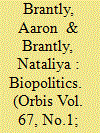

|
|
|
|
|
| Summary/Abstract |
COVID-19 and the subsequent global response have had a profound impact on the public health, economic health, and political health in nearly every country. This article examines the biopolitics of power and pandemics in war. Three case studies are presented: the Spanish influenza outbreak of 1918–1920 and responses to the COVID-19 outbreak in both Syria and in eastern Ukraine. The pandemic’s impact has been particularly acute in active warzones, undermining the ability of governments and organizations to enforce public health recommendations, provide for the care of patients, secure supplies, and transmit information.
|
|
|
|
|
|
|
|
|
|
|
|
|
|
|
|
| 2 |
ID:
172109
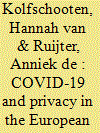

|
|
|
|
|
| Summary/Abstract |
When disease becomes a threat to security, the balance between the need to fight the disease and obligation to protect the rights of individuals often changes. The COVID-19 crisis shows that the need for surveillance poses challenges to the right of privacy. We focus on the European Union (EU), which has a strong data protection regime yet requires its member states to exchange personal data gathered through contact tracing. While public authorities may limit the right to privacy in case of public health threats, the EU provides little guidance when such limitations are proportionate. To define standards, we analyze existing EU case law regarding national security measures. We conclude that on the proportionality of contact tracing in the EU it is difficult to reconcile public health measures and individual rights, but guidance can be taken from understandings of proportionality in the context of security, particularly in the current COVID-19 emergency.
|
|
|
|
|
|
|
|
|
|
|
|
|
|
|
|
| 3 |
ID:
184193
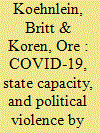

|
|
|
|
|
| Summary/Abstract |
The COVID-19 pandemic has constrained the ability of states across the world to govern and control their territories. As the state reduces its activities, space opens for violent non-state actors working for and against the state to fill the vacuum. Highlighting this trend, the present study evaluates the effects of COVID-19 and pandemics more broadly on attacks by non-state actors. Our theory emphasizes the incentives of both rebels and pro-government non-state actors (PGNs) to increase their attack frequency as disease spreads and the state retracts its governance activities to preserve resources needed elsewhere. In the first case, we highlight how the pandemic allows rebels to reduce asymmetries of power with respect to the military and establish themselves as a viable government alternative. In the second case, PGNs, which provide an alternative to militaries, are deployed to these contested spaces to thwart or pre-empt rebellion during the pandemic. Employing daily-level data on the annual change in armed conflict and COVID-19 cases across 127 countries between 1 January 2020 and 15 June 2020, we test both claims using an econometric identification strategy. We do not find clear evidence that COVID-19 led to a higher frequency of rebel attacks, suggesting that these groups prefer to bolster their standing using nonviolent means, or avoid fighting and preserve their resources. In contrast, we find that the frequency of PGN attacks has increased with COVID-19 prevalence compared with last year. Case studies of insurgent and PGN activity in Afghanistan and Nigeria lend additional support to these results, illustrating some underlying mechanisms. Our findings explore overlooked challenges that pandemics and other disasters pose to conflict mitigation and the role PGNs play in these contexts.
|
|
|
|
|
|
|
|
|
|
|
|
|
|
|
|
| 4 |
ID:
104338


|
|
|
|
|
| Publication |
2011.
|
| Summary/Abstract |
We use a CGE model to simulate the effects of a one-year US border closure. Relative to previously used input-output modeling, CGE modeling offers a flexible framework for capturing bottleneck and labor-market effects. Our analysis suggests that the costs of a prolonged closure could be much greater than indicated by input-output studies. We find that cutting all imports by 95% in an environment of sticky real wages would reduce GDP by 48%. However, if bottleneck imports (mainly oil) were exempt and workers accepted real wage cuts then the GDP reduction would be only 11%.
|
|
|
|
|
|
|
|
|
|
|
|
|
|
|
|
| 5 |
ID:
140558
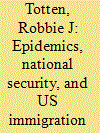

|
|
|
|
|
| Summary/Abstract |
What are relationships between epidemics, national security, and US immigration policy? This question is important because it sheds light on transnational or nontraditional security areas, American immigration policy, and a pressing issue for US leaders who have recently faced epidemics such as the West Africa Ebola outbreak that began in 2013. This article answers it and lays ground in the area by reviewing epidemics in world history, using International Relations and Security Studies works to specify dangers of contagions for states, and identifying three general immigration measures that American leaders have utilized from the seventeenth century to the present day to protect against contagions, which are (1) policies restricting entrance of foreigners thought to carry specified diseases, (2) the isolation or quarantining of immigrants with contagious disease, and (3) delegating the President with authority to stop immigration in the event of an epidemic abroad. This study has implications for research and contemporary US immigration policy.
|
|
|
|
|
|
|
|
|
|
|
|
|
|
|
|
| 6 |
ID:
098796


|
|
|
|
|
| Publication |
2010.
|
| Summary/Abstract |
The article critically explores how, and in what ways, the EU and ASEAN have addressed contemporary security issues, including non-traditional security threats. The comparison of the EU and ASEAN responses to these threats highlights the different forms and functions that regional integration has taken in Europe and Southeast Asia, and the implications of these differences for intra- and extra-regional security cooperation. The article considers how the EU and ASEAN might work more cooperatively together, noting some existing examples in which experiences and good practice are already shared, as well as other areas in which cooperation might be possible. The article concludes that while security cooperation in the EU and ASEAN, as well as between the two regional entities, is problematic, reflecting differing regional and national interests and organisational capabilities, there are concrete areas in which cooperation is possible.
|
|
|
|
|
|
|
|
|
|
|
|
|
|
|
|
| 7 |
ID:
176525
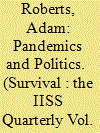

|
|
|
|
|
| Summary/Abstract |
Trust in leadership is essential because struggles against infectious diseases necessitate a degree of individual sacrifice for the social good.
|
|
|
|
|
|
|
|
|
|
|
|
|
|
|
|
| 8 |
ID:
186648


|
|
|
|
|
| Summary/Abstract |
The COVID-19 pandemic provides a unique opportunity to examine how local governments respond to a public health crisis amid high levels of partisan polarization. As an arena that has historically been relatively insulated from national partisan cleavages, public schools provide a useful window into understanding the growing nationalization of local politics. Leveraging the fact that all school districts had to adopt a reopening plan in fall 2020, we assess the factors that influenced school district reopening decisions. We find that mass partisanship and vested interests best explain the degree to which schools reopened. Republican (Democratic) districts were far more (less) likely to reopen in person, while districts with stronger unions relied more on remote learning. Notably, we find little connection between reopening decisions and indicators measuring the severity of the virus. Finally, public schools were sensitive to the threat of student exit. Districts located in counties with more Catholic schools were somewhat more likely to reopen in person. We assess the implications of these findings for U.S. education policy and the study of local government more generally.
|
|
|
|
|
|
|
|
|
|
|
|
|
|
|
|
|
|
|
|
|